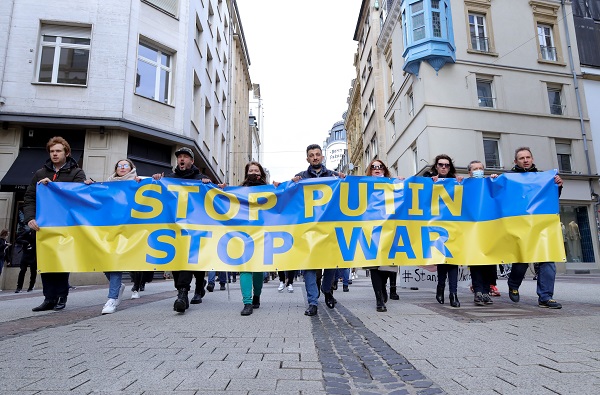 Anti-war protest in Luxembourg City on 24 February 2022;
Credit: Ali Sahib
Anti-war protest in Luxembourg City on 24 February 2022;
Credit: Ali Sahib
On Thursday 24 February 2022, the people of Ukraine awoke to the sound of bombs and the world woke up to the horrifying news of Russia’s unprovoked military invasion of the largest country entirely within Europe. The images and stories coming out of Ukraine since this fateful day have been heart-breaking and the war crimes committed unthinkable, particularly for those of us who have been fortunate to never know anything other than peace in Europe.
Now, almost one month on, more than three million people have fled the war in Ukraine in search of peace and security, leaving their entire lives behind and unsure when (if ever) they can return to their homes. The total number of casualties remains unknown, but the Office of the United Nations High Commissioner for Human Rights (ONCHR) has estimated that around 900 civilians were killed and over 1,450 injured between 24 February and 19 March 2022 (latest available estimates). In terms of military losses, official estimates from the United States (US) almost two weeks ago put Ukrainian military casualties at 2,000 to 4,000 and Russian military casualties at 5,000 to 6,000. The actual figure could be significantly higher.
With most men aged 18 to 60 forced to stay and prepare themselves to fight in Ukraine, the vast majority of refugees are women, children and the sick and / or elderly. Most of them (over two million according to the UN Refugee Agency) have flocked to Poland, a country which had previously attracted criticism over its treatment of migrants, but which now boasts an open-door policy for those fleeing the war in Ukraine. Several hundred other Ukrainian refugees have crossed the border into Romania, Moldova, Hungary (another European country known for its traditionally hostile approach to refugees) and Slovakia, many of them travelling on to other destinations in Europe.
Thanks to the European Union’s (EU) decision, on 4 March 2022, to activate the Temporary Protection Directive (an emergency mechanism aimed at providing immediate protection to displaced persons who are unable to return to their country of origin), refugees from Ukraine are entitled to stay and work in EU Member States for at least one year, with the possibility of extension for an additional two years. Other rights under this directive include access to housing, healthcare, social welfare assistance, education for children and adolescents and the labour market.
The response in Luxembourg, as in many other countries, has been one of overwhelming support and immense generosity towards the Ukrainian people. Over 3,000 refugees have arrived in Luxembourg from Ukraine to date. Whilst many are still looking for housing or employment, several hundred Luxembourg residents have already volunteered to open their homes to those fleeing the war. Hundreds of others have raised money, donated or collected humanitarian aid, transported and dropped off donations in or near Ukraine, offered to pick up and bring back refugees or set up other private initiatives here in Luxembourg to support the Ukrainian people during these challenging times.
Just last week, LUkraine asbl, a local non-profit organisation representing the Ukrainian community in Luxembourg and which has been instrumental in early and continued support efforts following the Russian invasion, confirmed that it had received over €450,000 in donations via bank transfer and €9,000 in cash donations, as well as having raised over €45,000 (and counting) via its Facebook fundraiser. To date, the non-profit has sent more than 300 tonnes of humanitarian aid to Ukraine as a result of these actions.
Whilst much remains unclear regarding the official procedures to follow upon the arrival of Ukrainian refugees, the Luxembourg Government has tried – and is still trying – to coordinate and centralise efforts, for instance by setting up the SHUK emergency reception centre in Luxembourg-Kirchberg and developing, together with the Luxembourg Red Cross and Caritas Luxembourg, an online form aimed at pairing Ukrainian refugees with host families. From what people in Luxembourg are saying on social media and in "real life", however, there is still room for improvement. Several people who had already registered their interest in hosting refugees with LUkraine asbl two to three weeks ago have had to do so again, this time through the Luxembourg authorities.
Nevertheless, the official procedures are slowly but surely developing, with the Foreign Ministry recently having clarified the arrival registration process and the Education Ministry having presented the procedures to follow for Ukrainian refugee children of school age.
In the meantime, all any of us can really do is be patient (regarding the administrative procedures) and volunteer our time, money and / or services to support Ukrainians in need where possible. As mentioned briefly above, there are so many ways we can help, from donating money to charity (Luxembourg Red Cross, Caritas Luxembourg, UNICEF Luxembourg, etc.) or dropping off our old (but functioning) laptops or smartphones at Digital Inclusion asbl, which then distributes the electronic devices among Ukrainian refugees, to attending anti-war protests or volunteering to sort donations at collection points such as Hôpital Kirchberg or to help groom the dogs of newly arrived Ukrainians in Luxembourg.
Moreover, for those who are unable to host Ukrainian refugees, there is the relatively new option of becoming a so-called "godparent" who supports them and their host families in their daily lives, for instance by running occasional errands, driving them to appointments or helping with paperwork. The list goes on and on.
On a separate but important note, let's hope that the (justified) solidarity we are now witnessing with the Ukrainian people will extend to ALL refugees in future. For if there is one positive thing this war has brought, it is the undeniable proof that we are stronger together.









